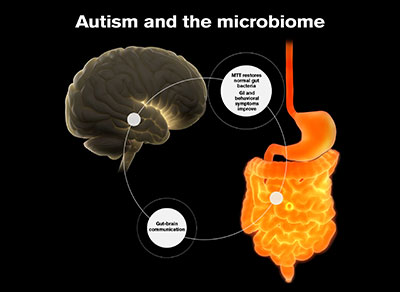Supplements targeting the gut offer a promising “adjunct therapy” for neurodevelopmental disorders, new research suggests.
The Iranian researchers say the supplements affect “gastrointestinal and behavioural symptoms”.

The link between the gut and the brain in autism, and how researchers at Arizona State University found microbiota transfer therapy, or faecal transplants, helped. Image by Shireen Dooling
Dr Amir Hossein Memari, of Tehran University, led the study. His team conducted a review study that weighed up existing evidence on the value of supplements.
Research suggests that many children on the autism spectrum have gastrointestinal problems.
According to a 2020 study, autistic children were “more than four-fold more likely to develop GI problems than those without ASD and, further, that constipation, diarrhoea and abdominal pain are reported most commonly”.
Arizona research
The Iranian study aligns with work by researchers at Arizona State University to improve gut health in children on the autism spectrum.
The Arizona researchers found that faecal transplants led to a 45 per cent reduction in core autism symptoms after two years.
‘Promising area’
The Iranian scientists found that supplements with probiotics and vitamins increased good bacteria. The supplements also decreased more harmful organisms in the gut for those on the autism spectrum, the scientists found.
In a statement, biomedical charity Thinking Autism said the review findings add “to the already large body of evidence” showing supplements can improve gut and behavioural symptoms.
The statement added: “Translational research in this promising area should be prioritised for the sake of the tens of thousands of people, many of whom have been suffering for decades, whose quality of life could be improved immensely.”
Probiotics and vitamins
The researchers reviewed 21 separate trials on the effects of supplements on people with neurodevelopmental disorders.
Seventeen of the trials looked at the effects of probiotics, vitamins and nutritional supplements on the gut of people diagnosed with autism and attention deficit hyperactivity disorder (ADHD).
The researchers found that probiotics could increase the presence of good gut bacteria “meaningfully”. Meanwhile, vitamins led to “significant increases” in beneficial strains.
‘Potential therapeutic effect’
The researchers claim their findings “suggest to clinicians that nutritional supplements, especially probiotics and vitamins, have a potential therapeutic effect in improving both gut health and behavioural symptoms”.
The theory linking the gut to autism is based on the idea that an overgrowth of bad bacteria can weaken the lining of the gut and reach the brain.
The review study was published in BMC Nutrition.
Related:
- Scientists link autism to gut health
- Challenging behaviours linked to gut
- Stool treatment ‘helps gut issues’
- Gut bacteria linked to behaviours
- Study reinforces role of gut health
- Research confirms gut-brain autism link
- Food enzyme tested as autism treatment
- Study finds faecal transplants effective
- Study seeks proof of gut link to autism
- Evidence grows for autism link to gut
- Study reinforces role of gut health
- Food enzyme tested as autism treatment
- Study finds faecal transplants effective
Published: 1 May 2025















